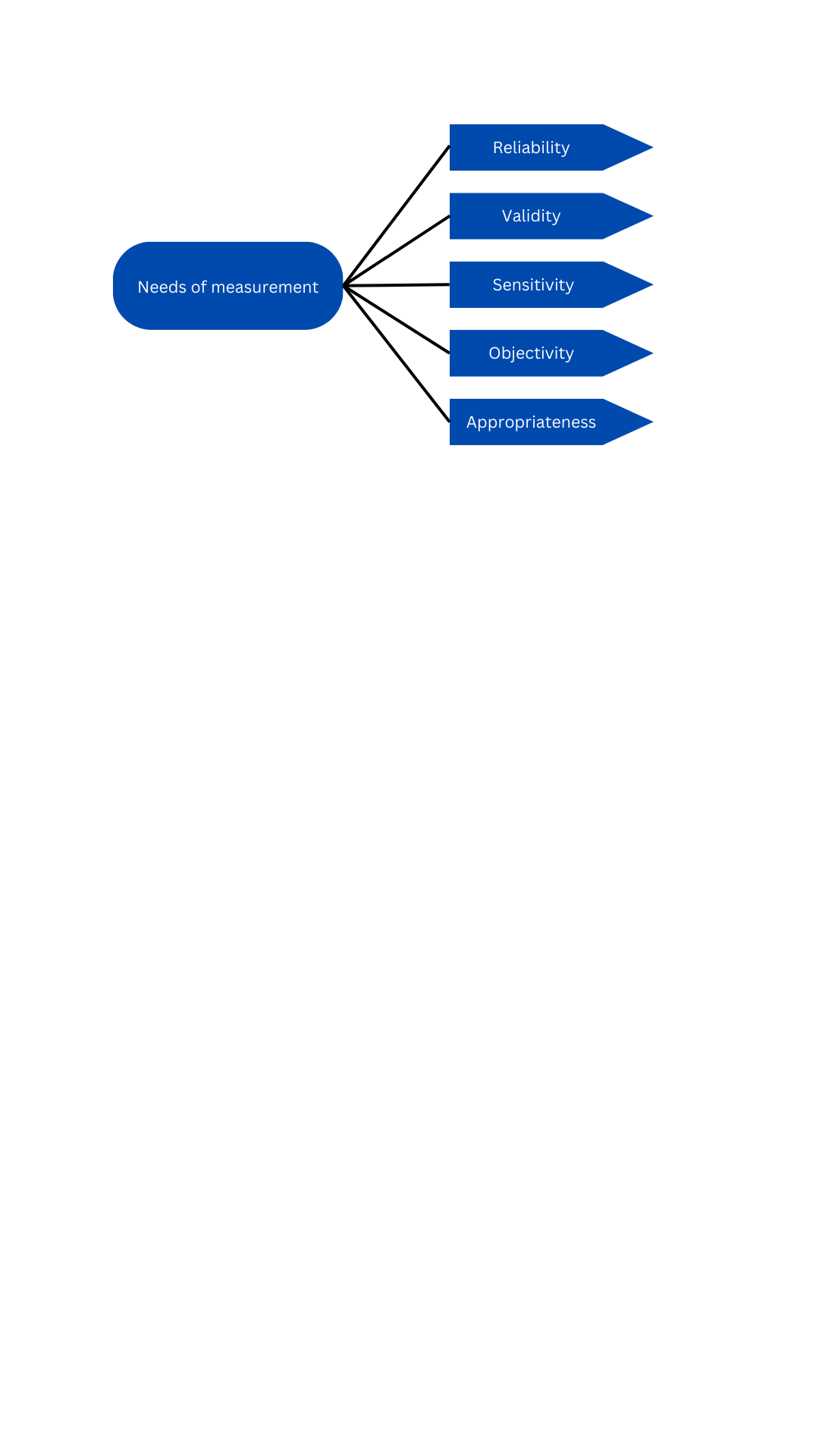Scaling and Measurement Technique: Needs of Measurement
Measurement is a critical component of research in any discipline. It is the process of assigning numbers or labels to variables in order to describe and quantify them. The purpose of measurement is to provide a standardized and objective way to describe variables and to make meaningful comparisons between them.
There are various techniques and scales available for measurement, including nominal, ordinal, interval, and ratio scales. Each type of scale has different properties and is appropriate for different types of variables and research questions.
The needs of measurement include the following:
Reliability: Reliability refers to the consistency and stability of measurement over time and across different settings. A measurement instrument must be reliable in order to produce consistent and reproducible results.
Validity: Validity refers to the accuracy and truthfulness of the measurement instrument. A measurement instrument must measure what it is intended to measure and should not measure anything else.
Sensitivity: Sensitivity refers to the ability of a measurement instrument to detect small but meaningful differences between variables. A sensitive measurement instrument is able to detect even subtle changes in the variable being measured.
Objectivity: Objectivity refers to the degree to which a measurement instrument is free from biases and subjective judgments. An objective measurement instrument should produce the same results regardless of who is using it.
Appropriateness: The measurement technique and scale chosen should be appropriate for the research question and the variables being measured. The choice of measurement technique and scale should be based on the nature of the variables being studied and the goals of the research.
In summary, measurement is a critical component of research and is necessary to make meaningful comparisons between variables. The choice of measurement technique and scale should be based on the research question and the nature of the variables being measured, and the measurement instrument should be reliable, valid, sensitive, objective, and appropriate.
Scaling and Measurement Technique: Needs of Measurement
Measurement is a critical component of scaling a business or organization. Without accurate and relevant measurements, it is challenging to understand how a business is performing, what needs improvement, and what strategies are working or not. The needs of measurement for scaling a business include:
Understanding the current state: Measurements help businesses identify their strengths and weaknesses, enabling them to focus on areas that require improvement. By collecting data and analyzing it, businesses can get a clear picture of their current state and take the necessary steps to grow and scale.
Goal setting: Clear goals are essential for scaling a business, and measurements help set those goals. Through measurement, businesses can determine where they are and where they want to be, and set achievable targets that align with their overall business strategy.
Monitoring progress: Once goals are set, measurements help businesses track their progress towards those goals. By regularly measuring and analyzing data, businesses can identify potential roadblocks and adjust their strategies accordingly.
Identifying trends: Through measurement, businesses can identify trends in customer behavior, market demand, and other areas critical to scaling. These insights can help businesses make informed decisions about future growth strategies.
Accountability: Measurements create accountability within a business. By setting goals and measuring progress, individuals and teams are held accountable for their performance, creating a culture of continuous improvement.
In summary, measurements are crucial for scaling a business as they provide insights into the current state, help set clear goals, monitor progress, identify trends, and create accountability.
The problem in Measurement and Management Research: Validity and Reliability
Measurement and management research are essential for understanding and improving business performance. However, the validity and reliability of measurements can be a significant problem in this field. Validity refers to whether a measurement accurately captures the intended concept or construct, while reliability refers to whether a measurement consistently produces similar results over time and across different samples.
The problem of validity arises when a measurement does not accurately capture the intended concept or construct. For example, if a survey is used to measure employee satisfaction, but the questions do not accurately capture all aspects of satisfaction, the results may not be valid. This can lead to incorrect conclusions and decisions based on flawed data. Therefore, it is essential to ensure that the measurement tools used in research are valid.
The problem of reliability arises when a measurement does not produce consistent results over time and across different samples. For example, if a survey is used to measure employee satisfaction, but the questions are worded differently or the survey is administered in different ways to different groups, the results may not be reliable. This can lead to uncertainty in the data and make it challenging to draw meaningful conclusions. Therefore, it is essential to ensure that the measurement tools used in research are reliable.
To address these problems, researchers can use various techniques to enhance the validity and reliability of their measurements. For example, they can use multiple methods to measure a construct or use established measures that have been validated and tested in previous research. They can also pilot-test their measurements with a small sample before using them in larger studies to identify and address any issues with validity and reliability.
In summary, validity, and reliability are critical issues in measurement and management research. To ensure that measurements accurately capture the intended constructs and produce consistent results, researchers must use rigorous techniques to enhance the validity and reliability of their measurements.
